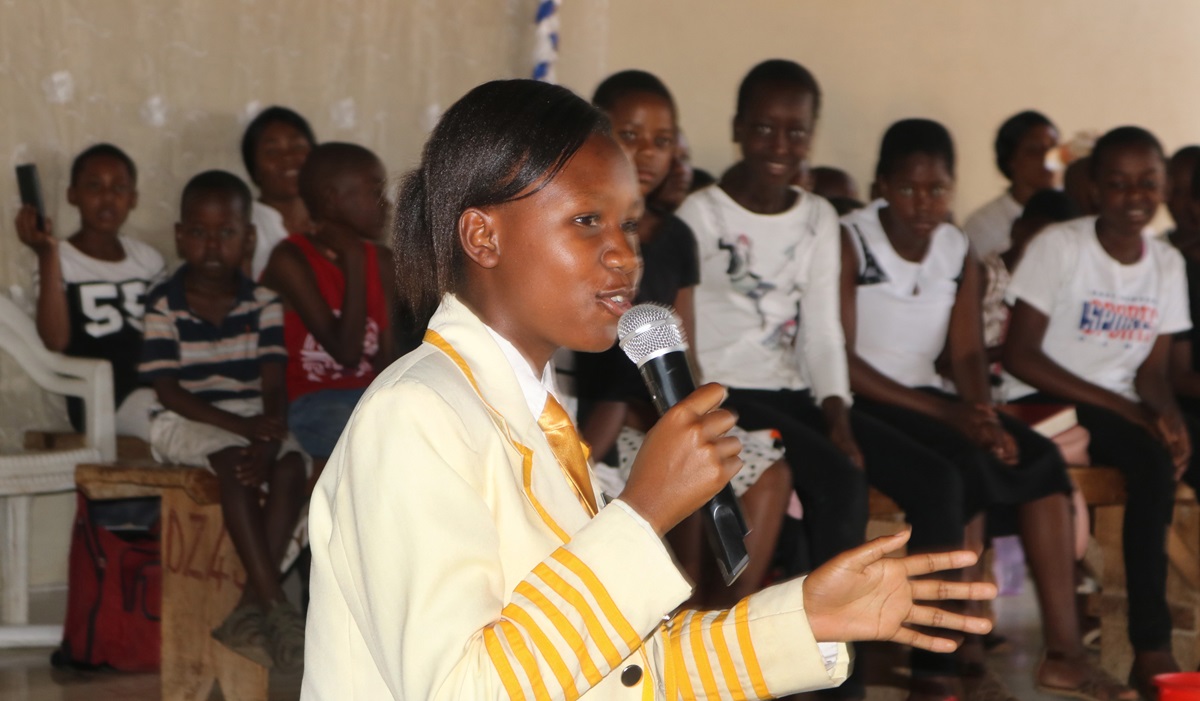The church needs to listen to the voices of young people and offer a safe space for abused children, said a member of junior Parliament during a Sunday service at St. Dorcas United Methodist Church.
“We do not need adults to become voices of the voiceless in the face of abuses against children,” said 17-year-old Melody Rudairo Nyamadzi, who represents the Kuwadzana East constituency in junior Parliament and is a member of United Methodist Youth Fellowship at St. Dorcas. “We have voices.”
Her call was echoed by scores of children during a special Sunday service led by the children’s ministry at St. Dorcas. Pre-schoolers and junior scholars recited poems and Bible memory verses around the theme of “Our Faith, Our Rights and Our Livelihood.”
Junior Parliament serves as a leadership development and advocacy arm of the government on the rights and welfare of children. It mirrors the structure of senior Parliament.
Nyamadzi attends Kuwadzana One High School. She studies history, family and religious studies and literature in English.
“Our voices as children have for too long been overshadowed by political matters in Zimbabwe, but as junior parliamentarians, our role is to raise our clarion calls against (gender-based violence) and speak for our peers.”
According to Zimbabwe’s 2012 Violence Against Children Survey Report, 33% of girls experienced sexual violence in childhood, while 64% of girls experienced physical violence. Nine percent of boys experienced sexual violence in childhood and 76% of boys experienced physical violence, the survey said.
The Rev. Vienna Mutezo, Zimbabwe West Conference connectional ministries director, concurred with Nyamadzi that, “the church needs to change its attitude and cultural understanding of children.”
Edson Nyamadzi, father of Melody, told the story of how his daughter has grown into an advocate for her peers.
“When she was still in primary school, she would always come home and report and express her feelings on how another child was wrongly accused or mistreated,” Edson Nyamadzi said. “To deal with the emotion, she would write poems narrating the ordeals of abused children.”
Melody believes that parental inattention has led to suicide.
“I was recently devastated to hear of a 10-year-old primary school child who committed suicide,” she said. “A life could have been saved if maybe somebody took time to listen to the boy.”
The young parliamentarian passionately queried if there was no way for the church and parents to respond to the plight of children.
“Parents, can we not spare the time and give an ear? Have we become too busy with our jobs at the expense of time with our families?
“If parents can’t do something, can the church not keep its doors open for the abused children to find a place they can run to?”
Dr. Itai Alistair Matambo, a medical practitioner and Dzivarasekwa Circuit Connectional Ministries chairperson, applauded the church for its brand promise, “Open Hearts, Open Minds, Open Doors.”
Subscribe to our
e-newsletter
“Opening up of the preaching plan to children is unique and one great way The United Methodist Church gives children a voice,” Matambo said. “Further, the church has demonstrated its dedication to children’s rights by crafting a Child Protection Policy.”
The Zimbabwe Episcopal Area’s Child Protection Policy sets minimum standards for abuse prevention for its local ministry settings. The policy is meant to demonstrate the denomination’s “concern for and commitment to the safety of all children, youth and vulnerable adults.”
Caroline Mutsago, a Global Missions fellow with the United Methodist Board of Global Ministries, believes the church holds a vital position in communities to fight against child abuse and gender-based violence.
“Definitely the church and particularly pastors are well positioned and respected by their communities and therefore can help shape behaviors or influence positive behaviors through educating the society,” she said.
At least once a year, congregations in the Zimbabwe Episcopal Area have a dedicated Sunday on their calendars for children’s ministry, where the young congregants participate in leading the worship service, preaching and providing music.
“From such Sundays, we have seen marvelous talents and gifts amongst children coming out,” said Mutezo.
She said that while the Zimbabwe church has made headway in children’s ministries, more work needs to be done.
“We must continue to do more in order to create safe spaces for the children,” she said.
Mutezo recently graduated with a master’s degree in Child Sensitive Social Policies. She wrote her thesis on “Understanding the Contributions of Orthodox Churches towards Child Abuse and Child Protection: A Case Study of The United Methodist Church in Harare.”
In her thesis, she proposed ways to curtail the prevalence of child abuse cases, including having more staff who specialize in children’s issues, and having all pastors take a course on child sensitive social policies to enhance awareness in the church and community.
Maforo is a United Methodist communicator for the Zimbabwe Episcopal Area.
News media contact: Vicki Brown at (615) 742-5470 or newsdesk@umcom.org. To read more United Methodist news, subscribe to the free Daily or Weekly Digests.
Like what you're reading? Support the ministry of UM News! Your support ensures the latest denominational news, dynamic stories and informative articles will continue to connect our global community. Make a tax-deductible donation at ResourceUMC.org/GiveUMCom.




